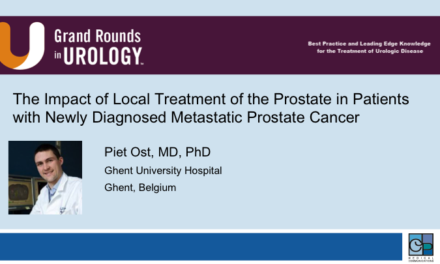Geoffrey Sonn, MD, presented “Patient Selection for Prostate Cancer Focal Therapy: Urologic Perspective” during the 7th Global Summit on Precision Diagnosis and Treatment of Prostate Cancer on September 23, 2023.
This content is available free to the GRU Community. Login or create an account to view it.
How to cite: Sonn, Geoffrey “Patient Selection for Prostate Cancer Focal Therapy: Urologic Perspective.” September 23, 2023. Accessed Nov 2025. https://grandroundsinurology.com/patient-selection-for-prostate-cancer-focal-therapy-urologic-perspective/
Patient Selection for Prostate Cancer Focal Therapy: Urologic Perspective – Summary
Geoffrey Sonn, MD, discusses patient selection criteria for prostate cancer focal therapy from a urologic perspective.
Focal therapy aims to treat only the cancerous lesion while preserving surrounding healthy tissue. Candidates for focal therapy typically have localized prostate cancer confined to a specific area of the gland. Imaging techniques such as multiparametric MRI (mpMRI) play a pivotal role in accurately identifying and characterizing these lesions, guiding treatment planning, and ensuring precise targeting during therapy.
Patient selection also hinges on tumor biology and clinical factors. Dr. Sonn explains that biomarkers and genomic testing help assess the aggressiveness and molecular characteristics of the cancer, aiding in risk stratification and predicting the likelihood of disease progression.
Dr. Sonn underscores the importance of patient-centered care in the era of precision medicine. When considering focal therapy as an option, each patient’s preferences, overall health status, and potential impact of treatment on quality of life must be carefully weighed.
The Global Summit on Precision Diagnosis and Treatment of Prostate Cancer is a unique multi-disciplinary forum organized to inform the key health care stakeholders about the emerging advances in clinical case and research and create a consensus-based vision for the future of precision care and educational and research strategy for its realization. The mission of the Summit is to fill the currently existing gap between the key experts of in vivo imaging, the world authorities in the in vitro fluid- and tissue-based molecular diagnostics, including genomics, and thought leaders in the development of novel observation strategies (e.g., active surveillance, or AS) and therapeutic interventions.
ABOUT THE AUTHOR
Geoffrey Sonn, MD is a board certified urologist who specializes in treating patients with prostate and kidney cancer. He has a particular interest in cancer imaging, MRI-Ultrasound fusion targeted prostate biopsy, prostate cancer focal therapy, and robotic surgery for prostate and kidney cancer. He was the Stanford principal investigator of a major clinical trial using MRI-guided focused ultrasound to treat prostate cancer. The goal of this trial was to treat prostate cancer with fewer side effects than surgery or radiation.
Dr. Sonn was born in Washington State and lived there until leaving for college at Georgetown in Washington DC. After graduating magna cum laude at Georgetown he returned to the West Coast for medical school at UCLA. Following medical school, Dr. Sonn completed a 6-year urology residency at Stanford where he developed particular interests in the clinical care of patients with urologic cancers and research in cancer imaging. He then spent two years at UCLA as a urologic oncology fellow where he devoted all his time to gaining additional skills and experience in clinical care and research in urologic malignancies. Since finishing his fellowship, Dr. Sonn has been at Stanford where he applies the skills he gained in residency and fellowship to provide high-quality clinical care to patients with urologic cancers. Dr. Sonn also continues to work to develop new methods to better diagnose and treat urologic cancers through research. His primary research focus is in prostate cancer focal therapy and developing artificial intelligence methods to improve prostate cancer detection on MRI and ultrasound.





